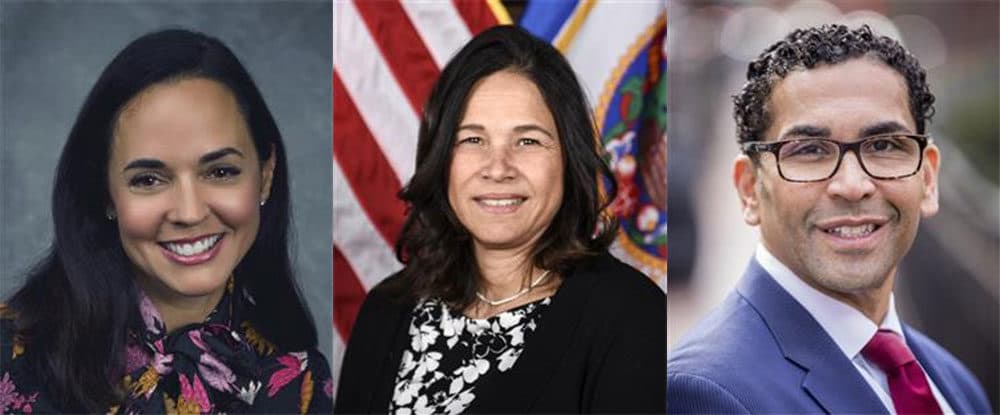Advertisement
Boston Names 3 Finalists For Superintendent

Boston has named three finalists in the search for the next leader of the city's schools.
They are Marie Izquierdo, chief academic officer for the Miami-Dade County Public Schools in Florida; Dr. Brenda Cassellius, former Minnesota education commissioner; and Dr. Oscar Santos, head of school for the Cathedral High School in Boston's South End.
All three finalists are people of color, and all began their careers in education in the classroom. But they’re relatively young, and none has been the superintendent of a large urban school district like Boston.
The Candidates
Most of Cassellius’ experience is in Minnesota, where she rose from paraprofessional to commissioner of education over two decades. During a brief time as a Memphis Public Schools administrator, Cassellius said Carol Johnson, former superintendent of Boston Public Schools, became an important mentor.
Cassellius is also under consideration for the top education job in Michigan, and will interview for that job next week.
Izquierdo is the daughter of a Cuban immigrant, and has spent much of her working life in Miami, Florida. She has served both at the state level — where she focused on “turnarounds” at struggling schools — and as a Miami-Dade administrator who worked on bringing technology into classrooms and supervising academics.
Izquierdo is the only of the three candidates without a doctorate, but she was a fellow at the selective Broad Academy, a program that has trained dozens of big-city superintendents. For years, some have faulted the program for what they call a corporate approach to public education.
Advertisement
The only Boston local in the bunch is Oscar Santos, who began teaching at English High in Jamaica Plain in 1996. After years as a headmaster and a superintendent of Randolph Public Schools, Santos was named the head of school at Cathedral High, a private Catholic school in the South End in 2013.
Most of Cathedral’s students are black or Latino, and Santos has faced student criticism — even protests — for failing to hire more diverse faculty and staff.
“It baffles me how this man is of Latino descent and does not see the importance of diversifying,” said Amel Viaud, who graduated from Cathedral two years ago. “If he couldn’t do that before, I do not think he could execute [it] now.”
Growing teacher diversity is one of the goals put forward in the recently updated job description for the BPS superintendent.
That said, Santos has overseen academic successes, including an uptick in test scores in an increasingly diverse Randolph and a continued trend of sending 100 percent of Cathedral graduates onto college.
What’s Next
Each will face a full day of public interviews next week: Izquierdo on April 22, Cassellius on April 23 and Santos on April 24.
There have been calls for more transparency and community engagement after the surprise exit of Tommy Chang and the hurried appointment of Laura Perille as interim superintendent last summer.
At times, Chang had struggled to win support for his more ambitious or consequential plans, like the closure of the Mattahunt Elementary School in 2016 and a systemwide reshuffle of school start times in late 2017. The district abandoned that plan after parents pushed back against the disruption of their families’ schedules.
Whoever takes the reins next will inherit more controversy.
The district is in the early stages of “BuildBPS,” Boston Mayor Marty Walsh’s 10-year, $1 billion plan to reshape the facilities and configurations of Boston schools.
But what seemed at first like a vague renewal program for the district’s aging buildings has come to include the closure of at least three schools and the relocation of hundreds of students. Just last week, another two schools in Allston learned they will have to move in the summer of 2022 due to a deteriorating building they share.
Activists are watching those decisions closely — and some are hoping that the next superintendent will rework these plans for the district’s future to better accommodate present-day families and teachers — “a champion for our public schools,” as parent-activist Kevin Murray put it.
With political snafus in the recent past, and more conceivably on the way, the district put an emphasis on the next superintendent’s “soft skills” in the updated job description, including visibility, courage, the ability to motivate and win people over.
That can be particularly important in Boston, which has torn up its share of out-of-town sports stars with its perceived negativity. Michael Loconto, chair of the Boston school committee, said the search committee deliberately sought out “people that had some knowledge of the city of Boston, or some knowledge of what it would be like to lead a large urban district, and a district that's as invested politically ... as Boston is.” (That could be an advantage for Santos, who has worked in and around Boston for 23 years.)
In Adrian Walker’s column in the Boston Globe last month, Walsh described Boston as a ”great place to learn how to be a superintendent.” He cited the many challenges that face people in the role, which has been vacated five times in the past 10 years.
But that phrase raised concerns for Murray. “I think it means [Walsh] is not looking for a highly experienced person, who’ll come here with a kind of gravitas,” Murray said. “I don’t think city leadership wants an education leader that they’ll have to defer to.”
Next week, Boston at large will have a chance to hear the three finalists out — on issues from testing to exam-school diversity to school closures and start times — and to gauge their readiness for one of the city’s toughest jobs.
Editor's note: This piece has been clarified to reflect that this public interview process is similar to the process followed in the 2015 superintendent search.
This article was originally published on April 17, 2019.
This segment aired on April 22, 2019.
